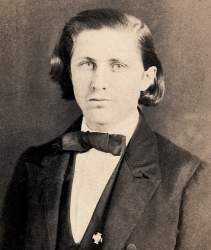Record Data
Transcription
On April 8, 1865, [Confederate General John] Mosby's command, pursuant to orders, met at Upperville, and Companies D and H were ordered on a scout down in Fairfax county…. The command assembled on [April] 9th at the appointed time and place, and there I learned, to my great regret and surprise, from a note received from Captain Glasscock, that he would be unable to accompany us on account of his wedding, which would take place in a few days. The command thus devolved upon me. It was an honor little coveted, but one from which I could not shrink. If I had been given a little more time, I might have found myself in an equally excusable situation…
At daybreak the squadron was mounted and moved in the direction of Burke's Station, trusting our presence had not yet become known to the enemy. But it seems the bird had flown, the Yankees had been apprised of our number, whereabouts and destination. As we approached Burke's Station, we found the mule teams, the object of our raid, gone, our scheme and enterprise frustrated, and the enemy preparing for us a warm reception. Seeing that the expedition was fruitless, we began to retrace our steps and reached Arundels, Lieutenant Carter being in the rear with some twenty men to prevent surprise. Just as the head of the column passed the Arundels house and Fairfax Station road, our men were assailed in the rear, and the rear guard forced into our column, creating some consternation and confusion. The squadron was quickly faced about and the enemy's charge repulsed. But their reinforcements coming up at this time, our men were brought to bay and victory lingered in doubt. Assured that a bold dash would save us, I endeavored to urge our men to charge, but they had now become somewhat dispirited and disorganized, and all attempts in that direction were futile. In this effort I was ably assisted by some of the officers and men of the command. In a short time our line began to waver and break, and retreat was inevitable. About two hundred yards south of Arundels was an open space of ground favorable for cavalry movements. Here I proposed to make a stand, and had succeeded in rallying about 50 men, but when the enemy approached and opened fire they gave way and joined in the retreat. The pursuit lasted until the Occoquan was crossed at Wolf Run Shoals, and it is there that Lieutenant Wiltshire claims the honor of having fired the last shot of the war. I was much mortified at the result of this fight, but felt I had done my best to avoid it. In this engagement my horse was shot in the nostrils and foreleg and nearly succeeded in unhorsing me. Company D in this fight numbered about 75 men, and Company H about 40 men. Opposing us were Companies G, H, and K, Eighth Illinois Cavalry, under Colonel [Charles] Albright, about 250 men. The loss on each side was nearly equal…
Colonel Albright may have captured a couple of horses, but where he found those provisions I cannot imagine, as Mosby's men had no wagons, or even haversacks. They usually carried their provisions in their stomachs, and not much there on this occasion, as we were without breakfast that morning….[Union] Colonel [William] Gamble seems to think that he had whipped Mosby's men, as usual, like the devil. If he had ever accomplished that feat before, it is not recorded in sacred or profane Yankee history, and if the critic will carefully review the reports from the Colonel himself, the advantage of this occasion will appear exceedingly small, hardly exceeding what Lord Coke would call molliter manus im possuit. Colonel Albright, in his report, admits his loss as two men wounded, five horses killed and four wounded, while he only claims to have inflicted on us a loss of one man wounded, five prisoners, six horses killed and six captured. I hope the devil will never whip him any worse. Our squadron was no part of Colonel Chapman's command, and unlike Colonel Albright's force, far away from any support or base of supplies. If there is any glory in this engagement, our Yankee friends are welcome to it. This was the last fight of the war. General Lee had surrendered the 9th but the fact was only known to us through hostile sources, which were not credited.





